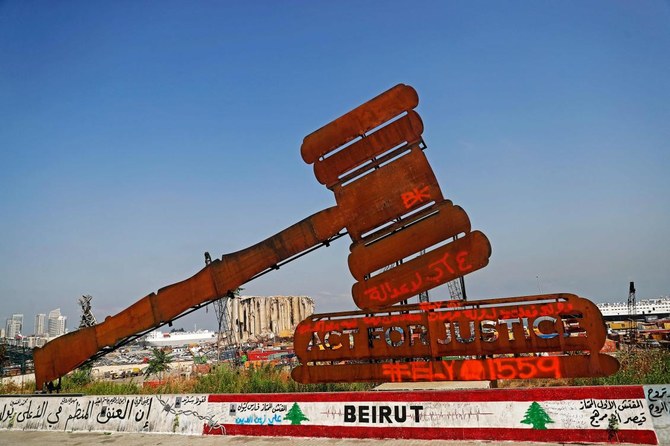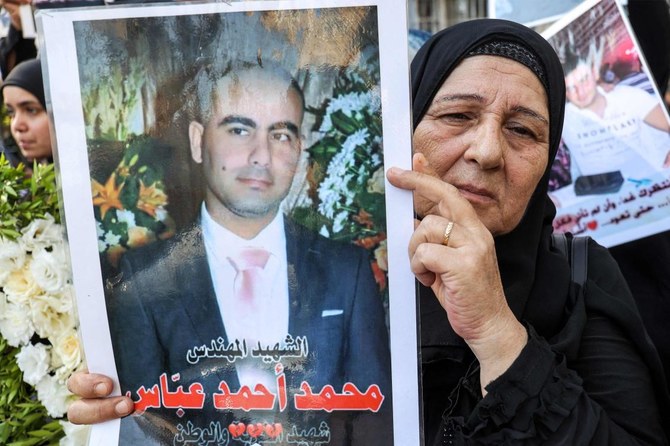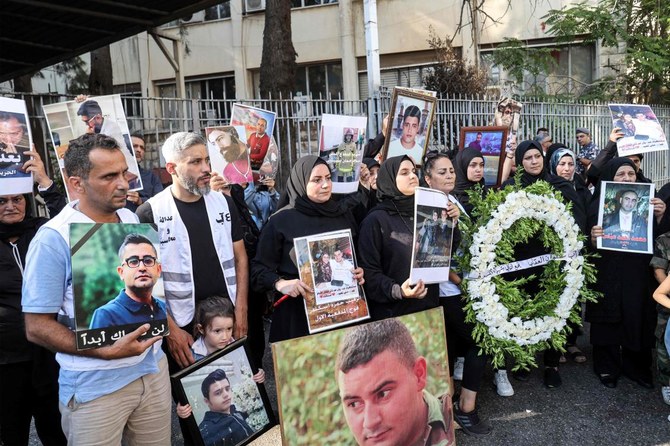BEIRUT: Lebanon marked three years since one of history’s biggest non-nuclear explosions rocked Beirut with hundreds of protesters marching alongside victims’ families Friday to demand long-awaited justice.
Nobody has been held to account for the tragedy as political and legal pressures impede the investigation.
On August 4, 2020, the massive blast at Beirut port destroyed swathes of the Lebanese capital, killing more than 220 people and injuring at least 6,500.
Authorities said the disaster was triggered by a fire in a warehouse where a vast stockpile of ammonium nitrate fertilizer had been haphazardly stored for years.
Three years on, the probe is virtually at a standstill, leaving survivors still yearning for answers.
Protesters, many of them wearing black and carrying photographs of the victims, marched toward the port shouting slogans including: “We will not forget.”
“Our pain inspires our persistence to search for the truth,” said protester Tania Daou-Alam, 54, who lost her husband in the explosion.
Lack of justice “is the biggest example of rampant corruption in Lebanon, and we can no longer bear it,” she said.
The blast struck amid an economic collapse which the World Bank has dubbed one of the worst in recent history and which is widely blamed on a governing elite accused of corruption and mismanagement.
Some protesters waved a Lebanese flag covered in blood-like red paint while others carried an enormous flag covered in a written pledge to keep fighting for justice.
“I have the right to know why my fellow Lebanese were killed,” said protester Jad Mattar, 42.
“It’s like living on top of a volcano, not knowing were it will explode. We want safety,” he added.
Since its early days, the probe into the explosion has faced a slew of political and legal challenges.
In December 2020, lead investigator Fadi Sawan charged former prime minister Hassan Diab and three ex-ministers with negligence.
But as political pressure mounted, Sawan was removed from the case.
His successor, Tarek Bitar, unsuccessfully asked lawmakers to lift parliamentary immunity for MPs who were formerly cabinet ministers.
The powerful Iran-backed Hezbollah group has launched a campaign against Bitar, accusing him of bias and demanding his dismissal.
The interior ministry has refused to execute arrest warrants which the lead investigator has issued.
In December 2021, Bitar suspended his probe after a barrage of lawsuits, mainly from politicians he had summoned on charges of negligence.
But in a surprise move this January, Bitar resumed investigations after a 13-month hiatus, charging eight new suspects including high-level security officials and Lebanon’s top prosecutor, Ghassan Oueidat.
Oueidat then charged Bitar with insubordination and “usurping power,” and ordered the release of all those detained over the blast.
Bitar has refused to step aside, but has not set foot inside Beirut’s justice palace for months.
“Work (on the investigation) is ongoing,” said a legal expert with knowledge of the case, requesting anonymity due to its sensitivity.
Bitar is determined to keep his promise to deliver justice for victims’ families, the expert added.
Rima Al-Zahed, whose brother was killed in the explosion, said: “The judiciary is shackled, justice is out of reach and the truth is shrouded.
But, “the truth does not die so long as there is someone to demand it,” she added. “We believe that we will get the truth.”
French President Emmanuel Macron, told Lebanese: “I am thinking of you.
“Lebanon was not alone then, and it isn’t alone now. You can count on France,” he posted.
Washington condemned the long delay in holding those responsible to account.
“The lack of progress toward accountability is unacceptable and underscores the need for judicial reform and greater respect for the rule of law in Lebanon,” said State Department spokesman Matthew Miller.
On Thursday, 300 individuals and organizations, including Human Rights Watch (HRW) and Amnesty International, renewed a call for the United Nations to establish a fact-finding mission — a demand Lebanese officials have repeatedly rejected.
“If those responsible are not held accountable, it will put the country on a trajectory that allows this kind of crime to be repeated,” HRW’s Lama Fakih told AFP at the protest.
Hundreds protest as Lebanon marks 3 years since Beirut blast
https://arab.news/8h5a5
Hundreds protest as Lebanon marks 3 years since Beirut blast

- Three years on, the probe is virtually at a standstill, leaving survivors still yearning for answers
- Protesters, many of them wearing black and carrying photographs of the victims, marched toward the port shouting slogans including: “We will not forget”
UK and Bahrain sign defense pact and £2bn investment deal

- The agreements were signed during an official visit to London by Crown Prince Salman bin Hamad, who held talks with British Prime Minister Keir Starmer at Downing Street
- The leaders express concern about the escalation of hostilities between Israel and Iran, and repeat prior calls for an immediate ceasefire agreement in Gaza
LONDON: Bahrain and the UK finalized two major agreements on Thursday during an official trip to London by Crown Prince Salman bin Hamad Al-Khalifa.
During a visit to No. 10 Downing Street for talks with British Prime Minister Keir Starmer, the prince and his host oversaw the signing of a Strategic Investment and Collaboration Partnership, SIP2 for short, said to represent a renewed framework for two-way investment between their countries.
The agreement will enable £2 billion ($2.7 billion) of investment by Bahrain’s private sector in key UK sectors including financial services, technology, manufacturing and decarbonization, officials said. It was signed by Bahrain’s finance minister, Sheikh Salman bin Khalifa Al-Khalifa, and the British chancellor of the exchequer, Rachel Reeves.
The second deal was a Defense Cooperation Accord which, according to officials, aims to enhance interoperability and joint training between the nations’ armed forces, building on the foundations of an already strong naval partnership. It was signed by defense ministers, Lt. Gen. Abdullah Al-Nuaimi and John Healey.
During his discussions with Starmer, Prince Salman reaffirmed the strength of relations between their countries, which he said continues to grow under the leaderships of King Hamad and King Charles, the Bahrain News Agency reported.
The leaders reviewed progress on a proposed UK-Gulf Cooperation Council free trade agreement, and the crown prince welcomed the UK’s decision to fully participate in the Comprehensive Security Integration and Prosperity Agreement, following a joint invitation in December from founding signatories Bahrain and the US.
Regional and wider international developments featured prominently in the discussions between Prince Salman and Starmer, who both expressed concern about the recent escalation of hostilities between Israel and Iran. They agreed on the urgent need to deescalate the conflict, ease tensions and resume dialogue.
They also reiterated previous calls for an immediate ceasefire agreement in Gaza, unimpeded humanitarian access to the territory, and the release of all hostages still held by Hamas.
Starmer congratulated Bahrain on its recent election as a nonpermanent member of the UN Security Council for a two-year term beginning in January 2026, and both leaders agreed to work closely to bolster their diplomatic efforts in the run-up to that.
Iran appoints new Revolutionary Guards intelligence chief

- He replaces Mohammed Kazemi
TEHRAN: Iran appointed a new chief of intelligence at its Revolutionary Guards on Thursday, the official Irna news agency said, after his predecessor was killed in an Israeli strike last week.
Major General Mohammad Pakpour, the commander of Iran’s Islamic Revolutionary Guards Corps , appointed Brig. Gen. Majid Khadami as the new head of its intelligence division, Irna said.
He replaces Mohammed Kazemi, who was killed on Sunday alongside two other Revolutionary Guards officers — Hassan Mohaghegh and Mohsen Bagheri — in an Israeli strike.
Pakpour had himself been recently appointed after Israel killed his predecessor Hossein Salami in a strike on June 13.
“During the years that our martyred commanders Kazemi and Mohaqeq led the IRGC Intelligence, we witnessed significant growth in all aspects of intelligence within the IRGC,” said Pakpour.
Israel launched air strikes on nuclear and military sites in Iran last week, claiming that its arch enemy was on the verge of developing a nuclear weapon, which Iran denies.
Israel killed several top Iranian officials, prompting a counter-attack by Iran, which on Thursday hit an Israeli hospital.
Upon his appointment by Iran’s supreme leader Ali Khamenei last Friday, Pakpour threatened to open “the gates of hell” in retaliation for Israel’s attacks.
Top Israeli figures have openly talked about killing Khamenei.
Australia closes Iran embassy citing deteriorating security environment

SYDNEY: Australia has suspended operations at its embassy in Tehran due to the deteriorating security environment in Iran and has directed the departure of all Australian officials, Foreign Minister Penny Wong said on Friday.
Australia’s ambassador to Iran will remain in the region to support the government’s response to the crisis, Wong said.
“We are continuing planning to support Australians seeking to depart Iran, and we remain in close contact with other partner countries,” Wong said in a statement.
Israeli scientists reel after Iranian missile strikes premier research institute

- “It’s a moral victory” for Iran, said Oren Schuldiner
REHOVOT, Israel: For years, Israel has targeted Iranian nuclear scientists, hoping to choke progress on Iran’s nuclear program by striking at the brains behind it.
Now, with Iran and Israel in an open-ended direct conflict, scientists in Israel have found themselves in the crosshairs after an Iranian missile struck a premier research institute known for its work in life sciences and physics, among other fields.
While no one was killed in the strike on the Weizmann Institute of Science early Sunday, it caused heavy damage to multiple labs on campus, snuffing out years of scientific research and sending a chilling message to Israeli scientists that they and their expertise are now targets in the escalating conflict with Iran.
“It’s a moral victory” for Iran, said Oren Schuldiner, a professor in the department of molecular cell biology and the department of molecular neuroscience whose lab was obliterated in the strike. “They managed to harm the crown jewel of science in Israel.”
Iranian scientists were a prime target in a long shadow war
During years of a shadow war between Israel and Iran that preceded the current conflict, Israel repeatedly targeted Iranian nuclear scientists with the aim of setting back Iran’s nuclear program.
Israel continued that tactic with its initial blow against Iran days ago, killing multiple nuclear scientists, along with top generals, as well as striking nuclear facilities and ballistic missile infrastructure.
For its part, Iran has been accused of targeting at least one Weizmann scientist before. Last year, Israeli authorities said they busted an Iranian spy ring that devised a plot to follow and assassinate an Israeli nuclear scientist who worked and lived at the institute.
Citing an indictment, Israeli media said the suspects, Palestinians from east Jerusalem, gathered information about the scientist and photographed the exterior of the Weizmann Institute but were arrested before they could proceed.
With Iran’s intelligence penetration into Israel far less successful than Israel’s, those plots have not been seen through, making this week’s strike on Weizmann that much more jarring.
“The Weizmann Institute has been in Iran’s sights,” said Yoel Guzansky, an Iran expert and senior researcher at the Institute for National Security Studies, a Tel Aviv think tank. He stressed that he did not know for certain whether Iran intended to strike the institute but believed it did.
While it is a multidisciplinary research institute, Weizmann, like other Israeli universities, has ties to Israel’s defense establishment, including collaborations with industry leaders like Elbit Systems, which is why it may have been targeted.
But Guzansky said the institute primarily symbolizes “Israeli scientific progress” and the strike against it shows Iran’s thinking: “You harm our scientists, so we are also harming scientific cadre.”
Damage to the institute and labs ‘literally decimated’
Weizmann, founded in 1934 and later renamed after Israel’s first president, ranks among the world’s top research institutes. Its scientists and researchers publish hundreds of studies each year. One Nobel laureate in chemistry and three Turing Award laureates have been associated with the institute, which built the first computer in Israel in 1954.
Two buildings were hit in the strike, including one housing life sciences labs and a second that was empty and under construction but meant for chemistry study, according to the institute. Dozens of other buildings were damaged.
The campus has been closed since the strike, although media were allowed to visit Thursday. Large piles of rock, twisted metal and other debris were strewn on campus. There were shattered windows, collapsed ceiling panels and charred walls.
A photo shared on X by one professor showed flames rising near a heavily damaged structure with debris scattered on the ground nearby.
“Several buildings were hit quite hard, meaning that some labs were literally decimated, really leaving nothing,” said Sarel Fleishman, a professor of biochemics who said he has visited the site since the strike.
Life’s work of many researchers is gone
Many of those labs focus on the life sciences, whose projects are especially sensitive to physical damage, Fleishman said. The labs were studying areas like tissue generation, developmental biology or cancer, with much of their work now halted or severely set back by the damage.
“This was the life’s work of many people,” he said, noting that years’ or even decades’ worth of research was destroyed.
For Schuldiner, the damage means the lab he has worked at for 16 years “is entirely gone. No trace. There is nothing to save.”
In that once gleaming lab, he kept thousands of genetically modified flies used for research into the development of the human nervous system, which helped provide insights into autism and schizophrenia, he said.
The lab housed equipment like sophisticated microscopes. Researchers from Israel and abroad joined hands in the study effort.
“All of our studies have stopped,” he said, estimating it would take years to rebuild and get the science work back on track. “It’s very significant damage to the science that we can create and to the contribution we can make to the world.”
IAEA chief identifies Isfahan as Iran’s planned uranium enrichment site

- Day before Israel launched its military strikes, Iran announced it had built a new uranium enrichment facility, which it would soon equip and bring online
- Israel’s attacks on Iranian nuclear facilities destroyed one of those plants and put another out of action by killing its power supply
VIENNA: UN nuclear watchdog chief Rafael Grossi on Thursday identified Isfahan, home to one of Iran’s biggest nuclear facilities, as the location of a uranium enrichment plant that Iran said it would soon open in retaliation for a diplomatic push against it.
The day before Israel launched its military strikes against Iranian targets including nuclear facilities last Friday, Iran announced it had built a new uranium enrichment facility, which it would soon equip and bring online. Tehran did not provide details such as the plant’s location.
Iran’s announcement was part of its retaliation against a resolution passed by the International Atomic Energy Agency’s 35-nation Board of Governors declaring Tehran in breach of its non-proliferation obligations over issues including its failure to credibly explain uranium traces found at undeclared sites.
Had it gone online, the new enrichment plant would have been the fourth in operation in Iran. But Israel’s attacks on Iranian nuclear facilities destroyed one of those plants and put another out of action by killing its power supply, the IAEA has said.
“There was an announcement, quite coincidentally, on the eve of the start of the military operation by Israel of a new enrichment facility in Isfahan, precisely, that we were going to be inspecting immediately, but this inspection had to be postponed, we hope, because of the start of the military operation,” Grossi said.
He did not say where exactly in Isfahan the planned plant was, but he said the nuclear complex there is “huge.”
The IAEA has previously reported that Israeli military strikes on Friday damaged four buildings at Isfahan, including the Uranium Conversion Facility that transforms “yellowcake” uranium into the uranium hexafluoride feedstock for centrifuges so that it can be enriched.
Grossi told the BBC on Monday that the “underground spaces” at Isfahan did not seem to have been affected. Officials say those spaces are also where much of Iran’s most highly enriched uranium stock has been stored.
The IAEA has not, however, been able to carry out any inspections since the strikes.
























